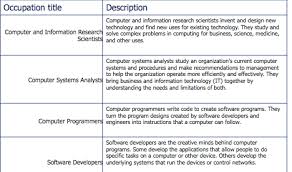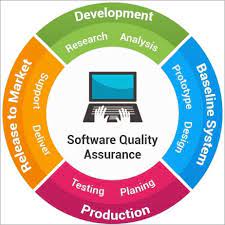Insights from the BLS: The Role of a Software Engineer in Today’s Job Market
The Role of a Software Engineer: Insights from the Bureau of Labor Statistics (BLS)
Software engineers play a crucial role in today’s digital world, designing, developing, and maintaining software applications that power various industries. According to the Bureau of Labor Statistics (BLS), software engineers are in high demand and are expected to have excellent job prospects in the coming years.
Job Duties
Software engineers are responsible for analyzing user needs, designing software solutions, writing code, testing applications, and debugging issues. They work closely with other team members, such as developers and project managers, to ensure that software projects are completed successfully and meet the required specifications.
Skills Required
According to the BLS, software engineers need a strong foundation in programming languages such as Java, C++, Python, or JavaScript. They should also have excellent problem-solving skills, attention to detail, and the ability to work both independently and collaboratively.
Education and Training
Most software engineer positions require a bachelor’s degree in computer science or a related field. Some employers may prefer candidates with a master’s degree or relevant certifications. Continuous learning is essential in this field due to rapid technological advancements.
Job Outlook
The BLS projects that employment of software developers, including software engineers, is expected to grow much faster than the average for all occupations. The increasing reliance on software across industries will drive demand for skilled professionals who can develop innovative solutions.
Conclusion
Software engineers play a vital role in shaping our digital future. As technology continues to evolve, their expertise will be instrumental in creating new applications and improving existing systems. If you have a passion for coding and problem-solving, pursuing a career as a software engineer could be a rewarding choice.
Top 5 Tips for Advancing Your Career as a Software Engineer
- Stay updated with the latest programming languages and technologies to remain competitive in the job market.
- Build a strong portfolio showcasing your projects, skills, and contributions to stand out to potential employers.
- Network with other professionals in the field through online platforms, conferences, and meetups to expand your opportunities.
- Continuously improve your problem-solving and critical thinking skills as they are essential for success in software engineering roles.
- Consider pursuing certifications or advanced degrees to enhance your expertise and credibility in the industry.
Stay updated with the latest programming languages and technologies to remain competitive in the job market.
Staying updated with the latest programming languages and technologies is essential for software engineers to remain competitive in the job market. As technology evolves rapidly, mastering new languages and tools not only enhances one’s skill set but also demonstrates adaptability and a commitment to continuous learning. By staying informed about industry trends and advancements, software engineers can position themselves as valuable assets to employers, increasing their opportunities for career growth and success in the dynamic field of software development.
Build a strong portfolio showcasing your projects, skills, and contributions to stand out to potential employers.
To enhance your prospects as a software engineer, it is crucial to build a robust portfolio that highlights your projects, technical skills, and impactful contributions. A well-curated portfolio not only demonstrates your proficiency in software development but also showcases your ability to solve real-world problems and collaborate effectively. By showcasing your achievements and capabilities through a strong portfolio, you can differentiate yourself and make a compelling case to potential employers about the value you can bring to their teams.
Network with other professionals in the field through online platforms, conferences, and meetups to expand your opportunities.
Networking with other professionals in the field is a valuable tip for software engineers looking to enhance their career prospects. By engaging with peers through online platforms, attending conferences, and participating in meetups, you can broaden your professional connections and gain insights into industry trends. Building a strong network not only opens up opportunities for collaboration and knowledge-sharing but also increases your visibility within the tech community. Embracing networking opportunities can lead to new career paths, mentorship possibilities, and a deeper understanding of the diverse roles within the software engineering domain.
Continuously improve your problem-solving and critical thinking skills as they are essential for success in software engineering roles.
Continuous improvement of problem-solving and critical thinking skills is paramount for success in software engineering roles. As technology evolves rapidly, software engineers must adapt to new challenges and complexities. By honing these essential skills, professionals can effectively analyze issues, devise innovative solutions, and contribute to the development of cutting-edge software applications. Embracing a mindset of lifelong learning and skill enhancement empowers software engineers to thrive in a dynamic and competitive industry landscape.
Consider pursuing certifications or advanced degrees to enhance your expertise and credibility in the industry.
Consider pursuing certifications or advanced degrees to enhance your expertise and credibility in the software engineering industry. Obtaining relevant certifications or furthering your education with advanced degrees can demonstrate your commitment to continuous learning and professional development. Not only can these credentials broaden your skill set and knowledge base, but they can also make you more competitive in the job market and open up new opportunities for career advancement. Investing in certifications or advanced degrees shows potential employers that you are dedicated to staying current with industry trends and technologies, ultimately boosting your credibility as a software engineer.




